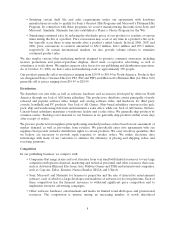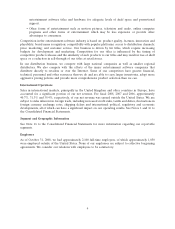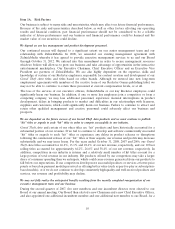2K Sports 2008 Annual Report Download - page 21
Download and view the complete annual report
Please find page 21 of the 2008 2K Sports annual report below. You can navigate through the pages in the report by either clicking on the pages listed below, or by using the keyword search tool below to find specific information within the annual report.total of eight board members. During that quarter we also engaged ZelnickMedia, a media investment and
management firm, to provide us with executive management services. The Board and ZelnickMedia
initiated a reorganization of our executive management team and our business in fiscal 2007. While we
substantially completed the reorganization in the past fiscal year, it is not yet possible to assess completely
how effective our new management team will be, whether it will be able to accomplish the objectives of our
new business development plan or whether our business reorganization plan will be of significant benefit to
us and our financial performance. In addition, the success of our business plan depends in part on events
and circumstances that are beyond our control, including general economic conditions, consumer demand
for our products and other factors affecting our industry.
Our business is highly dependent on the continued growth of current generation video game platforms and our
ability to develop commercially successful products for these platforms.
We derive most of our revenue from the sale of products for play on video game platforms manufactured
by third parties, such as Sony’s PLAYSTATION 3, PlayStation 2 and PSP, Microsoft’s Xbox 360 and
Nintendo’s Wii and DS. The success of our business is dependent upon the continued growth of these
platforms and our ability to develop commercially successful products for these platforms.
If the average price of our prior generation software titles continues to decline or if we are unable to sustain
launch pricing on current generation titles, our operating results may suffer.
The interactive entertainment software and hardware industry is characterized by the introduction of new
and enhanced generations of products and evolving industry standards. Consumer demand for software for
prior generation platforms has declined as newer and more advanced hardware platforms achieve market
acceptance. As the gaming software industry continues to transition to current generation platforms, we
expect prior generation titles will not be able to command premium prices and we expect that these titles
will be subject to price reductions earlier in their product life cycles than we experienced in prior years. As
a result, we have reduced prices for our prior generation software titles and we expect to continue to
reduce prices for such software titles, which will have a negative impact on our operating results. These
changes may cause the value of our inventory to decline substantially or to become obsolete.
Current generation titles for the PS3, Xbox 360, and Wii have been offered at premium retail prices since
the launch of such consoles. We expect to continue to price current generation titles at a premium level.
However, circumstances may arise in which we may need to reduce prices for such titles. For example, the
recent economic turmoil may reduce consumer demand and require us to reduce prices on our current
generation titles. If we are unable to sustain launch pricing on these current generation titles, it will have a
material adverse effect on our margins, profitability and results of operations.
The market for our titles is characterized by short product life cycles. The inability of our products to achieve
significant market acceptance, delays in product releases or disruptions following the commercial release of
our products may have a material adverse effect on our operating results.
The market for video games is characterized by short product lives and frequent introductions of new
products. New products may not achieve significant market acceptance, generate sufficient sales or be
introduced in a timely manner to permit us to recover development, manufacturing and marketing costs
associated with these products. The life cycle of a title generally involves a relatively high level of sales
during the first few months after introduction followed by a rapid decline in sales. Because revenue
associated with an initial product launch generally constitutes a high percentage of the total revenue
associated with the life of a product, delays in product releases or disruptions following the commercial
release of one or more new products could have a material adverse effect on our operating results and
cause our operating results to be materially different from expectations.
11
























